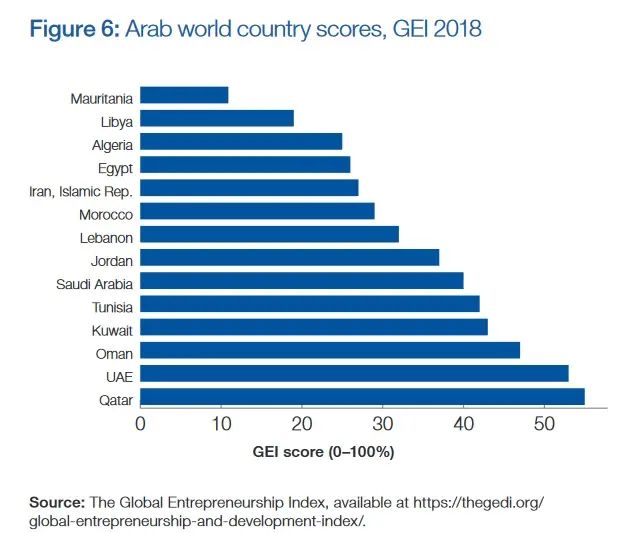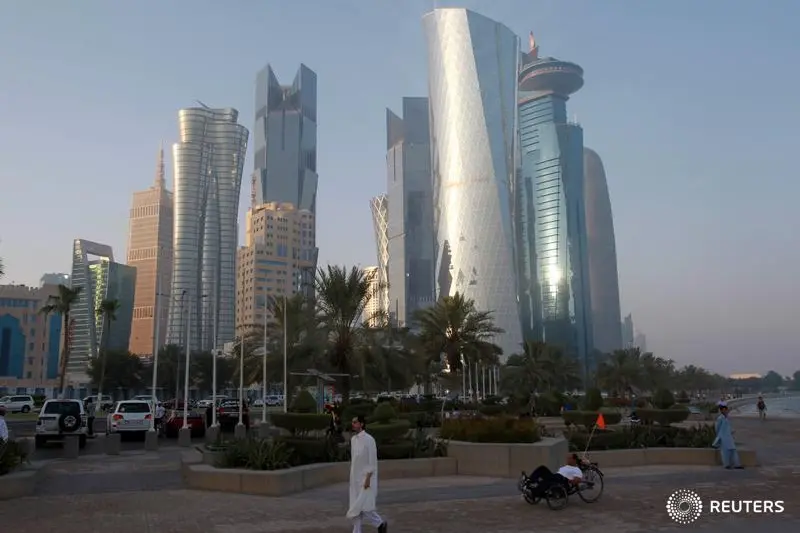PHOTO
Qatar has the healthiest entrepreneurship ecosystem in the Arab world, according to the new Arab Competitiveness Report 2018.
The report, compiled by the International Finance Corporation (IFC), the World Economic Forum and the World Bank, details the business environment and challenges faced by businesses in 137 countries around the world, including the six Gulf Cooperation Council (GCC) states, Egypt, Jordan and the other members of the 22-nation Arab League.
Its Global Entrepreneurship Index (GEI) ranked Qatar as the top Arab nation, followed by the United Arab Emirates and Oman. Tunisia was the top performer in North Africa.
According to the report, the GEI ranked nations on 14 components, including: startups’ skills, risk acceptance, cultural support, technology use, human capital and innovation.
The report praised a number of recent decisions for improving the entrepreneurial climate in Qatar.


“Qatar’s new Commercial Companies Law of 2015 cancelled minimum capital requirements to establish limited liability companies (LLCs). The One Stop Shop for Businesses and Investors program was also established to expedite start-up procedures for investors and entrepreneurs,” it said.
As for the UAE, it said the emirates has improved access to credit information through the provision of consumer credit scores to banks and financial institutions.
“The difference in average score (between Qatar and the UAE) is small, 55% to Qatar vs. 53% to UAE,” the report’s authors said in an emailed response to queries from Zawya.
“Qatar outperforms in high growth and opportunity startup,” it added.
The UAE ranked first among the Arab states on the report’s Global Competitive Index (GCI), however, holding 17th position among 137 countries surveyed. Qatar came second in the Arab world (25th overall), followed by Saudi Arabia (30th). The GCI ranking was based on 12 indicators, including include technology, infrastructure, macroeconomic environment, education, financial market development and innovation.
According to the report, product innovation and risk capital – which the authors defined as startup or growth equity capital, or loan capital provided by private investors or financial institutions – were the strongest areas of the Arab world’s startup ecosystem, while technology usage, competition and risk acceptance were the weakest.
The report said that startups in Arab countries attracted $560 million in investment from 260 deals in 2017, citing data from Magnitt - a platform that tracks and reports entrepreneurship development in the Middle East. Magnitt’s report for the first half of 2018, published earlier this month, found that deal volumes increased in the first half of the year, although deal values fell significantly.
Startup funds and accelerators
The report praised some GCC states for their efforts in supporting innovation and providing seed funding to startups, according to a press release that accompanied the competitiveness report. It said Saudi Arabia has created $1 billion fund for small and medium enterprises, while Bahrain and Oman have launched $100 million and $200 million startup funds respectively.
But Mouayed Makhlouf, IFC director for the Middle East and North Africa said that more changes are needed to enhance access to finance and trade for startups in the region.
“There has been some movement in this space. But all of this clearly is not enough if not coupled with serious macro-economic changes or macro-economic policies that would support more private sector involvement, more trade-friendly regulations,” Makhlouf said in a video conference from Lebanon with journalists in Dubai and Cairo on Tuesday.
Last year, Fadi Ghandour, founder of Dubai-based venture capital fund, Wamda, said changes in the Middle East’s inter-trade regulations are necessary for the startups to grow and scale.
The report said results from a survey of “leading entrepreneurs” in the region conducted by both the World Bank and the World Economic Forum in May 2017 showed that the three most critical factors in the success of a business in the Arab world were: access to markets (68 percent), access to finance (66 percent), and availability of talent (65 percent).
Makhlouf said that over the past two years, the IFC (a development funding arm of the World Bank) has invested $50 million in startups and venture capital funds in the Arab region.
Dozens of private and public startup accelerator programmes have been launched in several Arab states to support entrepreneurship in recent years. However, not all of these have released details about their source of funds or their criteria for inclusion of start-ups that they support.
Najy Benhassine, practice director for finance, competitiveness and innovation in the World Bank Group, said that the World Bank is working on creating indicators to measure accelerators’ performance across the world.
“This is not a problem specific to the Arab world … we lack information in that space and we, with the IFC, are starting to develop an initiative to better measure how those instruments are working,” Benhassine told the media via a video link from Washington.
(Reporting by Yasmine Saleh; Editing by Michael Fahy)
(yasmine.saleh@thomsonreuters.com)
Our Standards: The Thomson Reuters Trust Principles
Disclaimer: This article is provided for informational purposes only. The content does not provide tax, legal or investment advice or opinion regarding the suitability, value or profitability of any particular security, portfolio or investment strategy. Read our full disclaimer policy here.
© ZAWYA 2018





















